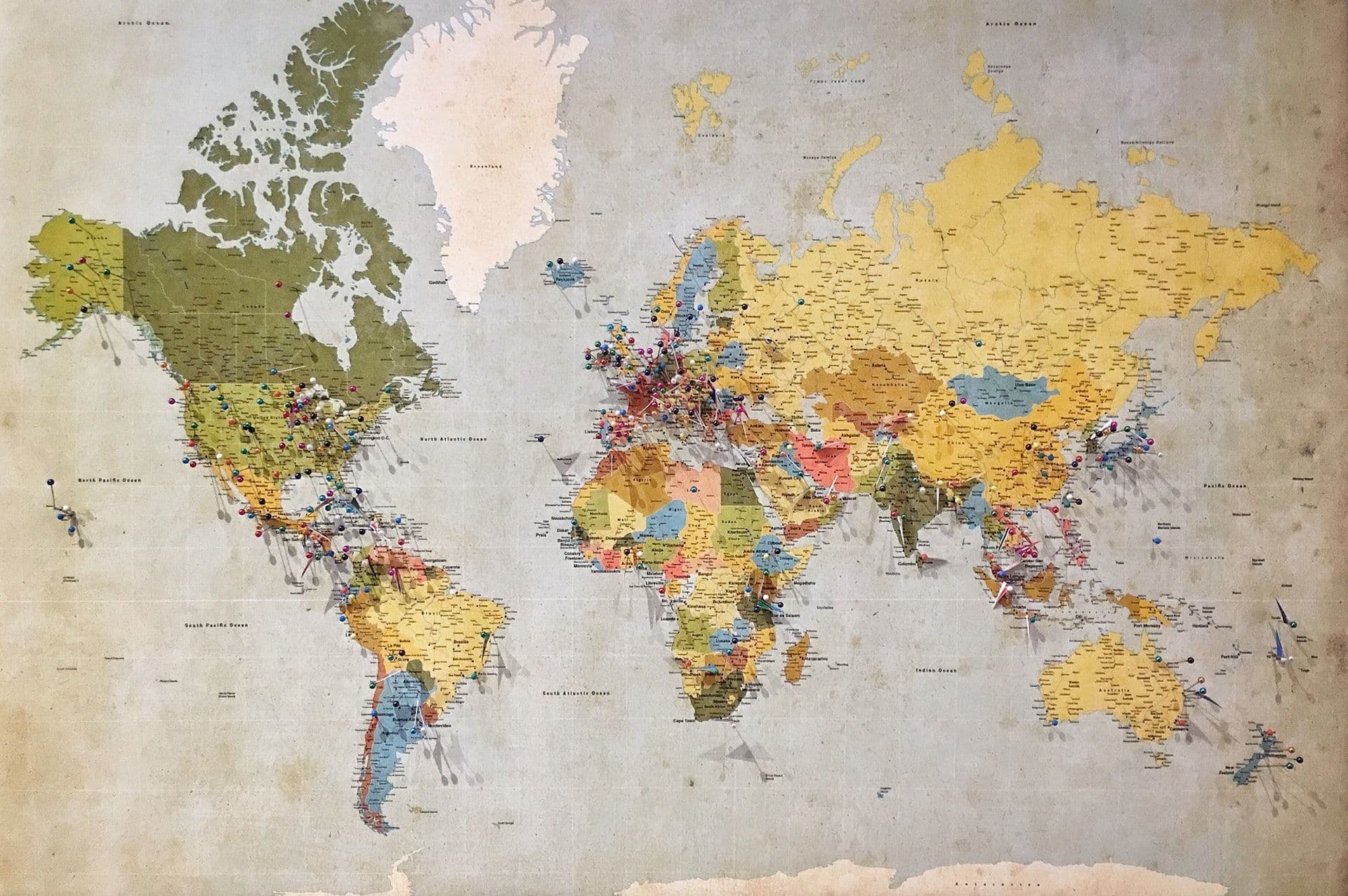
How to Study for the AP World History Exam
The AP World History exam is one of the longest APs (about 3 hours and 15 minutes), and requires a large breadth of knowledge. Although the exam covers historical events around the globe from the years 1200 to 2001, World History is less focused on the memorization of specific details than on the understanding of broad historical patterns, such as environmental changes, social movements, and technological advancements. With preparation, tenacity, and the right kind of practice, students can easily overcome the challenges presented by the AP World History exam, and learn valuable writing and critical thinking skills in the process!

This blog post was originally published on March 8, 2022, but has been updated with the most current information about the test.
The AP World History: Modern exam is one of the longest APs (about 3 hours and 15 minutes), and requires a large breadth of knowledge. The test is fully digital as of May 2025, but the length has not changed. Although the exam covers historical events around the globe from the years 1200 to 2001, World History is less focused on the memorization of specific details than on the understanding of broad historical patterns, such as environmental changes, social movements, and technological advancements.
With preparation, tenacity, and the right kind of practice, students can easily overcome the challenges presented by the AP World History exam, and learn valuable writing and critical thinking skills in the process!

What is on the AP World History Exam?
The AP World History exam contains multiple choice and short answer questions, one document based question, and one long essay. Here's the breakdown:
Multiple Choice
55 mins/55 questions
Multiple choice questions usually come in sets of 3-4 based on the same source. You’ll be asked to analyze the provided sources and answer relevant questions.
Short Answer
40 mins/3 questions
The short answer section basically asks you to write a mini-essay. The first two questions are both based on primary+secondary sources between the years 1200 and 2001. You have an option to choose between two prompts for the last short answer, with one option focusing on the period between 1750 - 2001. You’ll be asked to analyze the provided sources or prompts, and then put them in historical context.
Document Based Question
60 mins (including 15 min reading time)/1 question
For the DBQ, you’ll be provided with seven sources. You’ll then develop and support a historical argument citing these sources as well as your own knowledge. The sources will be from between 1450-2001.
Long Essay
40 mins/1 question
For the long essay, you’ll be provided with three prompts from different time periods between 1200 and 2001. You’ll pick one, then develop and support a historical argument based on your own knowledge.
In terms of historical themes, the exam will test you on:
- Unit 1: The Global Tapestry
- Unit 2: Networks of Exchange
- Unit 3: Land-Based Empires
- Unit 4: Transoceanic Interconnections
- Unit 5: Revolutions
- Unit 6: Consequences of Industrialization
The exam will not test you on:
- Unit 7: Global Conflict
- Unit 8: Cold War and Decolonization
- Unit 9: Globalization
When is the AP World History Exam?
In 2025, the AP World History Exam will be held on Thursday, May 8.
What to bring to the AP World History Exam
The AP World History: Modern Exam is one of 28 fully digital AP exams as of 2025.
Students should bring the following to the AP World History Exam:
- A fully charged device (laptop or tablet) with the Bluebook app installed - if your testing school is not providing one.
- A pen or pencil for use on scratch paper provided by the test’s proctor
- A government-issued or school-issued photo ID (if you don't attend the school where you'll be taking the test)
- The login information to your Bluebook account
- A watch (but make sure it doesn't beep, isn't "smart", etc)
Optional, but a good idea:
- The charger for your device
- A separate mouse and/or keyboard if you’re on a tablet.
Previously you would need to bring your accommodations letter with you if you were using accommodations on an AP exam. With the new digital format, accommodations are input through the Bluebook app and applied automatically. To request exam accommodations, visit the College Board website.
Is the AP World History Exam Hard?

AP World History is one of the more difficult AP exams, both on account of how much content one needs to learn, as well as the highly analytical and writing-based nature of the questions. It is also one of the most popular, which means that it can be hard to know whether the data is skewed or not, as many students may be taking the exam without sufficient preparation. But this is what the numbers tell us:
- The 2024 pass rate (a score of 3 is passing) for AP World History was 63.8%.
How Hard is it to Get a 5 on AP World History?
In 2024, only 11.9% of test takers received a 5 on the AP World History exam. An additional 32.3% earned a 4.
AP World History Digital Exam
AP World History digital exam format
The digital format is now the only version of the test available.
How long is the digital AP World History exam?
The digital AP World History exam is 3 hours and 15 minutes. A paper exam of the same length is no longer available.
AP World History Exam Tips
So AP World History is a pretty challenging test, both in terms of length, breadth of content, and the rigor of the questions. That being said, once you figure out its formulas, the exam can also be quite straightforward and forgiving.
Here are 6 tips for acing AP World History exam:
- Don’t try to memorize everything. The exam is testing you on your understanding of historical context and trends – focus more of your energy on understanding how different regions and events interrelate according to historical themes, rather than on specific names and dates.
- Keep up with class content. The most effective method to get a good score on the AP World History exam is through paying attention in class and diligently reading the textbook. It’s simply too much content to cram into a few days or weeks. If you keep up with class content throughout the year, you’ll walk into the test with a solid foundation of knowledge, even if you don’t remember everything.
- Read a prep book in the Spring. There are a lot of different AP prep book series out there — pick up a couple different copies and review the information inside. These books should not be considered substitutes for the textbook, but they can give you a good overview of course content and historical themes in a condensed, easy-to-read manner.
- Practice answering questions quickly. For the multiple choice section of the AP World History exam, you’ll need to be answering one question per minute if you want to complete the whole section. The best way to get good at timing is by taking as many practice tests as possible.
- Practice speed-writing. How well you do on the essay sections has much to do with timing. You’ll need to practice quick analysis of sources, as well as rapid formulating of arguments. You need to write an organized essay that both answers the question and has an effective thesis. Put your thesis (a single sentence outlining your overall argument) as the last sentence of the first paragraph. Each subsequent paragraph should explain one part of your argument, and should have its own topic sentence (a mini-thesis at the start of the paragraph). Again, the only way to get good at essay-writing is to practice with prompts.
- Answer every question. You’re not penalized for incorrect answers, so you have a better chance of doing well if you provide an answer for every question, even if you’re not sure if it’s correct.
How to Prepare for the AP World History Exam
When preparing for the AP World History exam, many students get stressed out trying to memorize every single date and name in their textbooks. This is not the way to go. The World History exam is actually pretty forgiving, and is not going to test you on the exact place and time someone did something. Instead, it’s going to ask you questions about long-term historical trends and patterns, and whether you can connect specific events to larger overarching themes.
The best way to study for the World History exam is to first take a practice test. Ivy Tutors Network offers regular mock and diagnostic exam taking, both in person and online. If you choose to find a free practice exam online, instead, make sure you find one from 2019 or later. Prior to 2019 the exam covered a larger amount of human history; the current exam starts with the year 1200. So make sure to find a practice test for the AP World History: Modern exam.
Once you’ve taken the test, review which areas you did well in and which areas you’re less familiar with. Is there a certain time period, region, or historical theme you’re tripping up on? This will help you focus where to put your energy.
Look back over your textbooks and notes. Try to fill in those gaps that you identified after the practice test. When going over previous content, it can be easy to go into robot-mode, reading the information but not really taking it in. To fully absorb content, read a chapter of your textbook or a section of your notes, then write a small summary paragraph outlining its main points. Where, when, and what happened in this section? Who were some of its key players? And how do the events covered in this section relate to larger historical themes?
This leads us to practicing essay-writing. For both the DBQ (document-based question) and long essay, the AP reviewers want to see whether you can summarize specific examples from whichever time period/place/event is being talked about, and then connect those examples to more general themes and historical trends. Think about it as zooming-in and then zooming-out; what happened, and how does it fit into the bigger picture? How did it impact surrounding regions, how did it change the trajectory of a certain place or people? Take a look at the essays you wrote during the practice test, and try to figure out how they can better match up with the current scoring guidelines. Remember, always write an outline before beginning the essay — beyond structure and historical accuracy, the greatest challenge is getting all your points across within 40-60 minutes. Try to be as succinct as possible. Longer essays are not automatically better essays.
Working with an experienced tutor can also go a long way when preparing for the exam. The AP World History exam tutors at Ivy Tutors Network are experts at helping students develop smart test taking strategies, as well as the requisite critical thinking skills to do well on an exam like AP World History. They can teach students how to construct essay outlines, formulate a cogent thesis, collect strong examples, and combine both micro- and macro-level perspectives to connect specific events to larger historical trends and themes. Alongside test-taking skills, our tutors help students better understand global chronologies and support them in memorizing detailed historical information.
Study Review Notes and Resources
For more information, check out the resources below:
Barron’s AP World History: Modern Review Book




